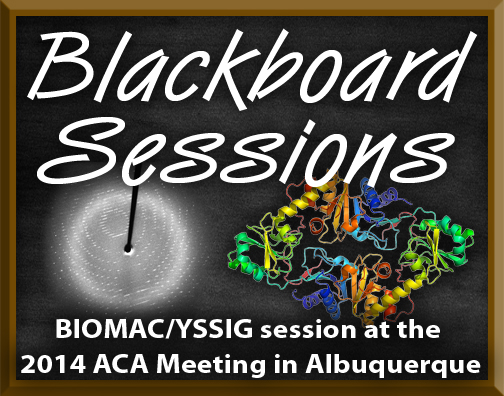Overview
This website accompanies session 2.1.3, "Data Processing With The Pros" co-chaired by Edward Collins and Andrew Torelli at the 2014 ACA Meeting in Albuquerque, NM. This is a revisit to the inaugural BlackBoard Session 3 years ago in which authors of popular X-ray crystallographic data processing program demonstrate how to handle datasets exhibiting different challenges that crystallographers frequently encounter.
Goal
The target audience is novice to advanced-intermediate X-ray crystallographers. The goal is to educate users not only in strategies to deal with each "dataset scenario", but also demonstrate how to use a variety of data processing programs that you might not have used before.
Software and Data
Links at the left will take you to the example datasets and software that will be showcased during the session. The datasets were chosen to be representative of common data processing challenges, e.g. weak anomalous signal, radiation damage, etc. We expect these datasets to be "tough, but workable." For each dataset, the original data (diffraction images) are available for download as well as the processed data files, log files and a list of instructions provided by each of the authors using their software. Finally, the output from SFCheck generated for the output files from each program is available as an "apples-to-apples" comparison.
Your Role
You are encouraged to download the original diffraction images for each "dataset scenario". Try processing them on your own using the different software (available from link at left). You can then compare your results/method with those of the software authors and be prepared to ask questions during the session at the ACA meeting. Remember, your feedback is valuable to the authors! Please let them know what could be improved. If you have trouble with this website, please e-mail Andy Torelli (torelli at bgsu dot edu).
Acknowledgements
This venture would not be possible without the considerable efforts of several people and funding from the ACA. We are specifically indebted to James Holton and Kay Diederichs for continuing to provide critical logistical support and helpful discussions. We also thank our speakers, James Pflugrath (Rigaku), Wladek Minor (HKL-3000), Harry Powell (iMosflm), Keitaro Yamashita (RIKEN Spring 8), and Michael Ruf (PROTEUM), who diligently processed the datasets and generated documents describing methods/use of the software. Also, a special thanks to Alexander Wlodawer (Center for Cancer Research, N.C.I.), Dan Bonsor and Eric Sundberg (University of Maryland School of Medicine) and Min Yao (Hokkaido University) for generously sharing the datasets analyzed for this session. Finally, thanks to Alyssa Crick for her graphic design work.



